American Arcadia review
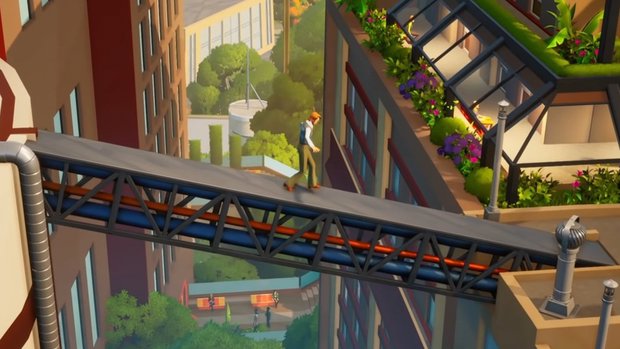
- 0 Comments
Plenty of spectacle and (momentary) game overs in this lively dual-character, genre-defying hybrid
In the competitive media industry, the ever-shortening consumer attention span is big business, and boredom should be avoided at all costs. This concept sets the stage for American Arcadia, a game that’s quite a lot of things: a colorful, cinematic, narrative-focused adventure that’s also a 2D action-oriented puzzle-platformer except when it’s a first-person stealth game except when you’re solving logic puzzles. It’s set in the 1970s except it actually takes place in 2023, but there’s also a lot of 1930s-1950s aesthetics. There are two main characters and themes of big entertainment business and corruption and social media and personal identity and what makes a happy life. References abound to movies, TV, games, music, fashion, historical figures and literature. It’s a lot to juggle, and much like this paragraph, it creaks under the weight of all it tries to accomplish. But it’s also just good, fun, light-hearted, popcorn-munching entertainment, and one thing it manages not to be in its seven-hour runtime is boring. Unlike Trevor.
Trevor Hills is dangerously boring. While sweater vests, pet turtles, and meaningless office jobs may not be a crime where you come from, in the domed utopia of American Arcadia, it’s punishable by death. That makes Trevor a daredevil living life on the edge of extreme mundanity, with every neighborly wave and unattended party inching him one step closer to the chopping block. Not that he knows it. In Arcadia, the residents don’t realize the true nature of the city: a giant TV set where their lives are being filmed 24/7, like a mass version of “The Truman Show.” In American television, ratings are king—and ratings are slipping. Which means that the least popular citizens are the weakest link, and these characters are about to be killed off.
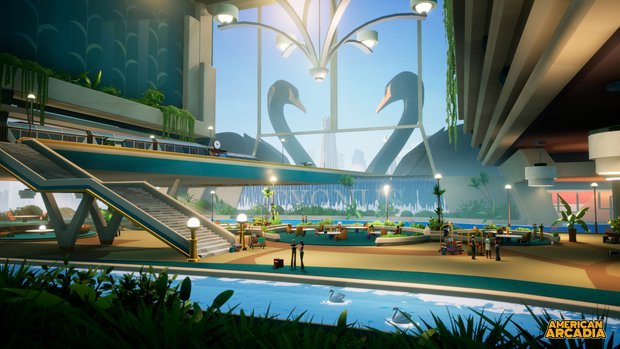
If you’re questioning the plausibility of that premise, you’re probably thinking too hard. American Arcadia leans a little campy in its writing, painting its characters and story beats with broad strokes of cliche, pop-culture references, and a plot with bigger holes than a pair of bell-bottom jeans. But you could probably already guess from the bright cartoon visuals that this game wasn’t going to carry a lot of serious emotional heft. That’s not to say it isn’t smartly crafted, though. Spanish developer Out of the Blue previously brought us Call of the Sea, the Lovecraftian puzzle adventure from 2020. Although a vastly different game than their debut title, American Arcadia has similarly stylish cinematic visuals, solid voice acting, and creative storytelling. They may wear a lot of their inspiration on their sleeves, but with all of the outlandish scenarios, quippy dialogue, and inventive perspective changes, I found myself actually smiling in places as I was strung along through the clever surprises and twists.
The first of these “twists” is no secret, being one of the big advertised features of the game: as you play, you switch back and forth between control of Trevor and a hacktivist named Angela Solano, who is using her position at Disne–I mean, uh, “Walton Media” to help Trevor break out and avoid his fate, with the ultimate goal of revealing corruption and taking down the entertainment behemoth. These two characters each have very different gameplay styles, and the way they are interspersed, and even combined in some scenes, is what gives American Arcadia its unique hook.
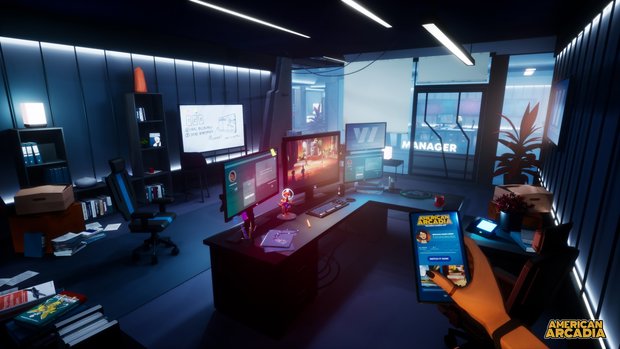
Trevor is played in side-scrolling 2.5D and involves a bit of basic platforming, some stealth, and lots and lots of running. Arcadia is something of its own country within the US (approved by the Supreme Court, no less), and they have a ridiculous amount of law enforcement that will be hot on your heels through most of the game as you try to escape, feeling something like The Fugitive as you dash through buildings and sewer tunnels on your way to the edge of the dome and freedom. But the only reason Trevor’s caught wise to any of the sinister goings-on is because of Angela, and he’ll need her help along the way. In her position at Walton Media, she has access to all of the camera feeds and can trigger most of the other electronic devices like door locks, construction equipment, and digital signage, so she’s the one guiding Trevor through an earpiece and clearing the obstacles out of his way. And by “she,” of course, I also mean you.
It’s a fun idea to meld these two characters together into the same scene, and in gameplay terms it mostly works. If you’re using mouse and keyboard, then as Trevor you’re running and jumping with WASD and Space, and at times you will see a prompt that there’s a camera view available, in which case you press TAB and the view will change to a nearby CCTV feed. You’re still in full control of Trevor, but you now have the added ability, as Angela, to click on an object or two, highlighted with hotspots, in order to activate a device or open a door. You may also have multiple cameras available to switch between in a given area.
If you’re in the middle of a chase sequence, these scenes are tense and cinematic, but in practice there’s something just clunky and demanding enough about it that the dramatic tension can have the tendency to give way to frustration. There’s so much going on at once, and the timing isn’t terribly forgiving; miss a couple of seconds and it’s too late, you’re caught. I failed—often several times per scene—either due to not understanding what was required of me or because it’s simply hard to execute the running, jumping, tabbing and clicking. The developers recommend using a controller, so I switched to that part-way through, but didn’t find it any more intuitive and ultimately switched back. Although you may only be returned back ten or fifteen seconds (sometimes longer) when you get caught, the fact that you hear all the same lines over and over decreases the impact of what is otherwise a well-paced bit of action.
It’s not all so demanding of the reflexes, though. When playing Trevor, there are also some fairly simple puzzle-platforming and stealth segments that will have you pushing around boxes to get higher, and hiding behind objects as you wait for guards to divert their gaze elsewhere. I was grateful for some of these slower segments, not just to get a breather, but also to appreciate more of the lushly detailed environments. Arcadia is an opulent, super-saturated paradise of retrofuturism, set in some kind of alternate 1970s, because that’s groovy, I guess. Shopping malls, hotels, and suburban bungalows are bathed in red-orange hues and filled with anachronistic technologies like cleaning robots and flying delivery drones. Even though Trevor plays in 2D, there are plenty of interesting background details and animations that reward a closer look and make the city feel lived in, as people mill around, going about their work day, swimming in rooftop pools, or playing arcade cabinets in the mall. If I wasn’t so dangerously boring myself, it would make for a nice place to visit.
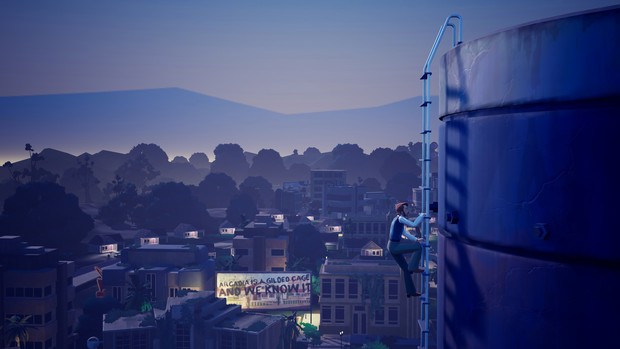
But you aren’t only playing in Arcadia. While Angela spends much of her time directly watching and helping Trevor, she will also break away from her computer monitor (with nicely seamless transitions) and accomplish other covert tasks in the modern setting outside the dome. These are all played in first-person perspective and will have you snooping for clues to passwords, avoiding detection from security systems, and solving one-off logic puzzles that I think are supposed to pass as hacking, if you squint. While not quite as visually stylish as Trevor’s segments, there are some memorable moments from these sections as you have awkward interactions with your all-too-loyal boss or try to sabotage an animatronic “It’s a Small World” nod of a ride so you can shut it down and access some restricted areas nearby.
In fact, whether you’re playing as Trevor or Angela, what really seem to take center stage in this production are the story and presentation. While more plot-driven than character-driven, it’s quite a plot, filled with wild scenarios and tense conflicts that wind through engaging set pieces and clever twists. The many different styles of gameplay are there to enhance the story rather than being the central focus, which can make for a disjointed playing experience at times, but many of the individual moments are undeniably compelling. One of the best scenes in the game has you playing both Trevor and Angela simultaneously in a pitch-perfect bit of dramatic tension as both characters are a razor’s edge from being caught. But once again, the difficulty of the gameplay meant that the tension was gradually released as I played the scene through multiple times.
There’s tons of voice acting, as Trevor and Angela often banter back and forth or interact with people around them, and even when they’re alone, they frequently talk to themselves (don’t we all). The acting is done well, and the dialogue is often quite charming and light-hearted, but it’s overwritten in places, making the characters sometimes grating as they try too hard to make jokes or overplay their caricatured personalities. You won’t be able to wring much complexity out of the characterization, save for maybe one scene in the latter half that hinted at more depth, but as long as you accept the slightly on-the-nose nature of the writing, the overall effect is still plenty likable.
While the story deftly reeled me in and propelled me along, it started feeling cluttered towards the end, with the twists and threads never quite reaching a satisfying conclusion. In fact, I began losing my sense of just what it was the characters really wanted and what exactly drove them, and while it had something of a Black Mirror vibe, with the story seemingly becoming more of a statement about society than one about individuals, I wasn’t entirely sure what the statement even was, and the character arcs felt flatter than I was anticipating. So in the end I enjoyed the entertaining ride but was a little disappointed that the narrative fell short of being particularly impactful or memorable.
Final Verdict
American Arcadia, as entertainment about pop-culture entertainment, manages to achieve many of the highs and some of the lows of the TV and films it frequently references. On the plus side, it’s charming, cinematic, stylish, and clever. It has likable characters and a captivating if implausible premise. It’s tightly paced, never lingering, and full of action, humor, plot twists, and cultural winks and nods. Despite all of that, or maybe because of all of that, it doesn’t quite settle into a core identity, tending to skim the surface of its clever ideas and gameplay hooks without fully diving in. The thematic ideas of exploitation, social value, and personal identity are worthy topics, but are treated broadly and are generally upstaged by the sensationalism of the plot. And if you’re used to a slower pace of gameplay, some of those action-oriented sequences where you’re expected to quickly read the situation and juggle multiple things at once might prove a little frustrating. But on the whole, American Arcadia is highly original and a good bit of fun, and the dual-character scenarios are certainly worth celebrating, so if you approach the game more like popcorn entertainment than something with more meat, I think you’ll find plenty of good stuff to munch on.
Hot take
Like a bingeable TV show, American Arcadia is slickly presented and tightly paced, resulting in a charismatic and entertaining theme park ride of an adventure, even if the simple characters and somewhat unfocused approach to gameplay doesn’t foster much lasting impact.
Pros
- The story hooks you early, ramps up the tension, and doesn’t let go until the end
- Environments are bold, colorful and have many layers of charming detail
- Dual-character gameplay scenarios are quite original and merge well with the plot
- Good voice acting filled with humor and pop cultural references keeps things light and fun
Cons
- Characterization and thematic elements lack depth
- Some running/platforming sections require quick timing and can be frustrating and tedious to replay
- All of the different gameplay styles can feel disjointed at times
Brian played American Arcadia on PC using a review code provided by the game's publisher.


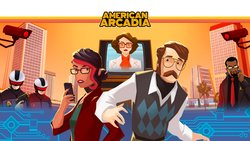
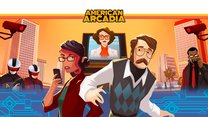






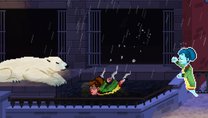
0 Comments
Want to join the discussion? Leave a comment as guest, sign in or register in our forums.
Leave a comment